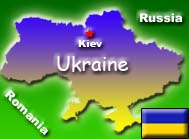Ukrainian leaders hope IMF loan will fix bleak economy
 Kiev- Ukraine's political leadership on Thursday was hopeful a 16.4-billion-dollar International Monetary Fund (IMF) loan would improve the former Soviet republic's current bleak economic outlook - an opinion shared neither by markets nor independent experts.
Kiev- Ukraine's political leadership on Thursday was hopeful a 16.4-billion-dollar International Monetary Fund (IMF) loan would improve the former Soviet republic's current bleak economic outlook - an opinion shared neither by markets nor independent experts.
"This is good news, the reaction of investors is positive," said President Viktor Yushchenko at a meeting with top bank managers. "This (the IMF loan) is a signal for world society to increase its level of trust towards our country."
Ukraine's leading PFTS stock market was however unimpressed, with shares diving an average eight per cent in value during Thursday morning trading.
"Of course the market is unimpressed, the IMF money has not changed Ukraine's fundamentals, which are bad," said Oleh Koniushenko, a trader.
The IMF on Wednesday formally announced it would send Ukraine the low-cost two year credit, which is badly needed to stave off bank collapses and rocketing foreign debt.
Yushchenko said last week that Ukraine might default on billions of dollars of bonds issued on international markets, were his country unable to secure IMF assistance.
The first cash infusion, a tranche of 4.5 billion dollars, could be received by the National Bank of Ukraine as soon as Friday, Yushchenko said.
A newly-passed package of legislation to implement tight fiscal controls, combined with the IMF cash infusion, would be sufficient not only to stave off disaster, but to turn around Ukraine's troubled economy, the Ukrainian leader predicted.
Major Ukrainian industries, including steel, chemicals, and agroproducts, have, since October, reported expected income reductions of as much as 40 per cent on the year.
The IMF imposed harsh loan conditions on Ukraine, demanding: a wider float of the national currency, the hryvna; practical elimination of budget deficits; and tighter controls on Ukraine's mostly-unregulated and, until recently, highly-profitable banking industry.
Ukraine's government has struggled to control the impact of the world financial crisis. During October alone, it spent some 20 per cent of its entire supply of foreign currency reserves in a failed attempt to prop up the hryvna.
"People are getting rid of their hryvnas ... and that's less money in the economy," said Viktor Vornonov, a currency trader. "The sense is 'Things could get worse and the government can't stop it.'"
Among other impending problems, Ukraine faces a massive increase in foreign debt, potentially increasing the money owed abroad from 54, to 78 per cent of expected GDP, Korrespondent magazine reported. This comes on top of payments already due on the country's outstanding debt.
The IMF, in a Wednesday statement, was downbeat on the Ukrainian economy for the medium term, predicting a GDP contraction in 2009 - the first overall reduction since
1999.
Ukrainian Prime Minister Yulia Tymoshenko was nonetheless positive, telling reporters in Kiev the IMF assistance "gives the possibility of totally and completely stabilising the financial situation in Ukraine."
Improved government cash flow and tight control of Ukraine's national budget will ensure continued GDP expansion, just at a slower pace than in previous years, Tymoshenko said. She also said the policies would lead to continued increases in average pay.
Almost without exception, independent Ukrainian economists have for months pointed to falling international prices for major Ukrainian exports such as metals, grains, and machines as grounds for pessimism on medium-term economic growth.
GDP contraction of as much as 3 per cent for 2009, along with a rise of the annual inflation rate from 17 per cent to 30 per cent is possible, according to a market analysis by Dragon Capital, a leading Ukrainian securities trader.
Tymoshenko on Thursday downplayed such worries, insisting the nationwide increase in bank liquidity resulting from the loan would kick Ukraine's currently stalled economy back into gear and bring renewed profits to business large and small.
"It's nice the government got money from the IMF at such a cheap rate (4 per cent a year). I bet some government officials get rich" said Oleksander Berdnik, a computer graphics company manager.
"But right now the interest rate a bank would charge someone like me is about six or seven times that, and I doubt it will go down any time soon." (dpa)